
OS DESAFIOS DA IMPLEMENTAÇÃO DAS CÉLULAS DE APRENDIZAGEM COOPERATIVA DE FORMA REMOTA DO PROGRAMA FOCCO: UM RELATO DE EXPERIÊNCIA DOS ARTICULADORES
Introdução: O Programa de Formação de Células Cooperativas (FOCCO), instituído da Universidade do Estado de Mato Grosso (UNEMAT) em 2012, tem como princípios gerais diminuir a evasão dos alunos dos cursos de graduação, aprimorar o rendimento acadêmico, além de formar profissionais proativos e habilitados para o trabalho em equipe. Com a pandemia do novo coronavírus, em 2020, as atividades antes presenciais passaram a ser realizadas de forma remota. Assim, o presente relato tem como objetivo abordar a percepção das articuladoras das células cooperativas nesse contexto. Metodologia: As atividades foram realizadas em plataformas online durante os meses de abril a dezembro de 2020, com estudantes de diferentes cursos de graduação da UNEMAT. A divulgação e o convite aos acadêmicos da UNEMAT foram realizados através das redes sociais (Instagram), Podcasts e grupos de WhatsApp para maior interação com os participantes da célula cooperativa. O uso do google formulários foi utilizado para registrar a frequência dos participantes e também para investigar a opinião sobre as temáticas abordadas durante os encontros. Resultados: Mesmo com as adversidades encontradas durante o desenvolvimento das atividades, foi perceptível o empenho das articuladoras para buscar a manutenção dos acadêmicos tanto nas células quanto na Universidade. Foram observados pontos positivos e negativos, porém foi possível perceber que o trabalho desenvolvido auxiliou nesse suporte emocional dos acadêmicos, além de desenvolver a independência frente aos estudos. Conclusão: As estratégias e mudanças que foram utilizadas nos encontros das células cooperativas reforçam a interação e comunicação entre os participantes por meio das plataformas digitais, o que permitiu dar continuidade e oportunizar novos encontros, mesmo com algumas limitações. Além disso, as mudanças foram importantes para o aprimoramento do rendimento acadêmico e maior conhecimento sobre as diversas plataformas disponíveis.
OS DESAFIOS DA IMPLEMENTAÇÃO DAS CÉLULAS DE APRENDIZAGEM COOPERATIVA DE FORMA REMOTA DO PROGRAMA FOCCO: UM RELATO DE EXPERIÊNCIA DOS ARTICULADORES
-
DOI: 10.22533/at.ed.26821290417
-
Palavras-chave: Ensino online; Formação à Distância através das Tecnologias da Informação e das Comunicações; Aprendizado Ativo; COVID-19; Educação em Saúde.
-
Keywords: Online teaching; Distance Training through Information and Communication Technologies; Active Learning; COVID-19.
-
Abstract:
Introduction: The Cooperative Cell Formation Program (CCFP), established by the Universidade do Estado de Mato Grosso (UNEMAT) in 2012, has as general principles to reduce the evasion of undergraduate students, improve academic performance, in addition to training professionals proactive and enabled for teamwork. The pandemic of the new coronavirus, in 2020, the activities that took place in person began to be carried out remotely. Thus, this report aims to address the perception of the articulators of cooperative cells in this context. Methodology: The activities were carried out on online platforms during the months of April to December 2020, with students from different undergraduate courses at UNEMAT. The dissemination and invitation to UNEMAT academics was carried out through social networks (Instagram), Podcasts and WhatsApp groups for greater interaction with the participants of the cooperative cell. The use of google forms was used to record the frequency of participants and also to investigate the opinion on the topics addressed during the meetings. Results: Even with the adversities encountered during the development of activities, it was noticeable the efforts of the articulators to seek the maintenance of academics both in the cells and at the University. Positive and negative points were observed, but it was possible to perceive that the work developed helped in this emotional support of academics, in addition to developing independence in relation to studies. Conclusion: The strategies and changes that were used in the meetings of the cooperative cells reinforce the interaction and communication between the participants through the digital platforms, which allowed to continue and provide opportunities for new meetings, even with some limitations. In addition, the changes were important for the improvement of academic performance and greater knowledge about the various platforms available.
-
Número de páginas: 6
- Adrielle Rodrigues dos Santos
- Dionatan Costa Rodrigues
- Francimary Pinheiro Silva
- Lauriene Fernanda de Campos
- Letícia Moreira Andrade
- ANNA MARCELLA FERREIRA ROSA


